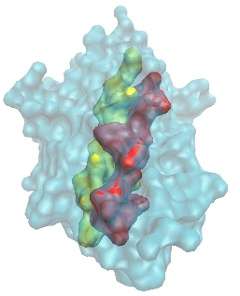Machines may help predict, eliminate allergens

(Phys.org) —It's well known that allergies and asthma are on the rise around the globe. Food allergies alone rose 50 percent in children from 1997 to 2011, according to a recent study at the Centers for Disease Control and Prevention.
That's part of why Chris Lawrence and Ha Dang, researchers from the Virginia Bioinformatics Institute and the Department of Biological Sciences in the College of Science at Virginia Tech, created Allerdictor, a new computational approach and software that helps predict allergens. A scientific article describing this method was recently published in the journal Bioinformatics.
"As more biotechnology derived products like new protein-based therapeutics or genetically modified plants are developed, it becomes increasingly important for potential allergens to be identified and dealt with before these come to market," said Lawrence, the project director. "Predicting allergens more accurately will also aid in basic scientific research."
The Virginia Tech scientists report that Allerdictor predicts allergens with very high accuracy at fast speeds. Instead of using standard approaches for identifying allergens, Allerdictor uses machine-learning approaches—methods borrowed from artificial intelligence research—to learn and apply that learning to analyze large-scale submissions for the presence of allergens.
This approach makes it easier and faster to scan large sequences of data, eliminating allergens and making sure businesses and consumers are protected.
Ha Dang, the first author of the paper and the developer of Allerdictor, said, "This new approach for identifying potential allergens is also applicable when analyzing the vast amount of genomic data that is being produced from various DNA sequencing projects worldwide. Most current methods of allergen prediction tend to be slow and inaccurate, yielding false positives that skew the data. Allerdictor literally takes minutes to analyze entire genomes."
More information: Ha X. Dang and Christopher B. Lawrence. "Allerdictor: fast allergen prediction using text classification techniques." Bioinformatics (2014) 30 (8): 1120-1128 first published online January 7, 2014 DOI: 10.1093/bioinformatics/btu004
Journal information: Bioinformatics
Provided by Virginia Tech

















